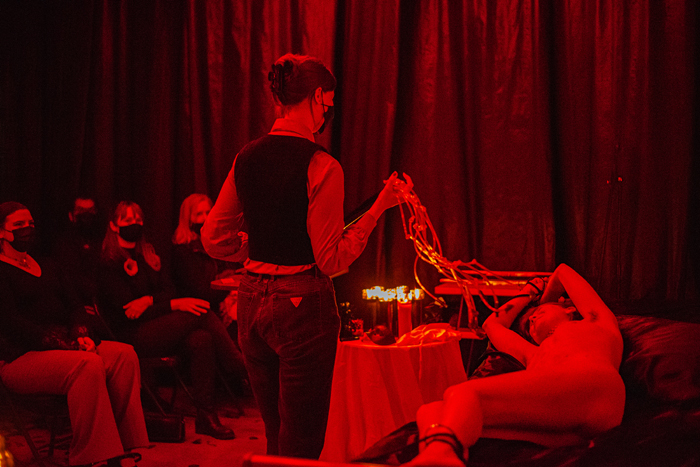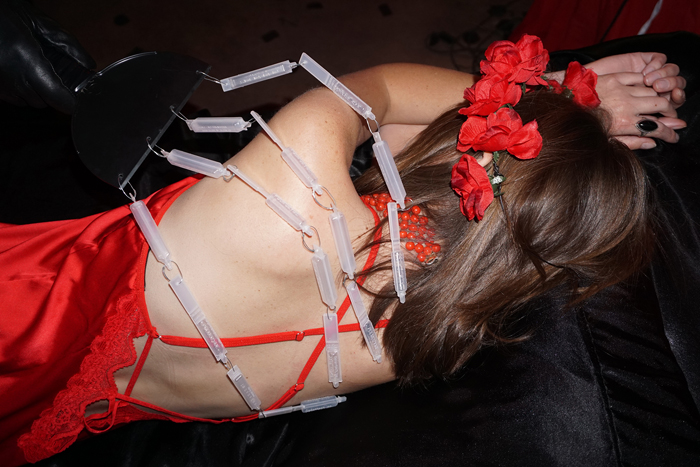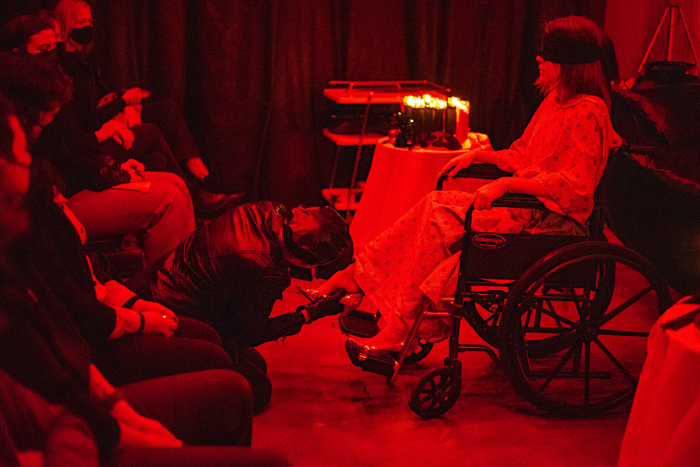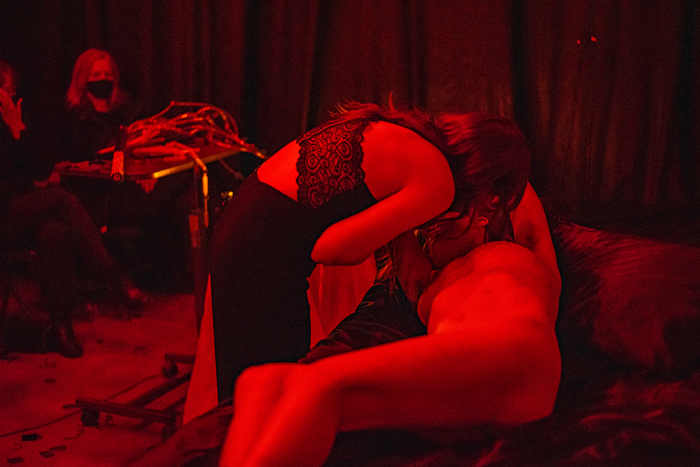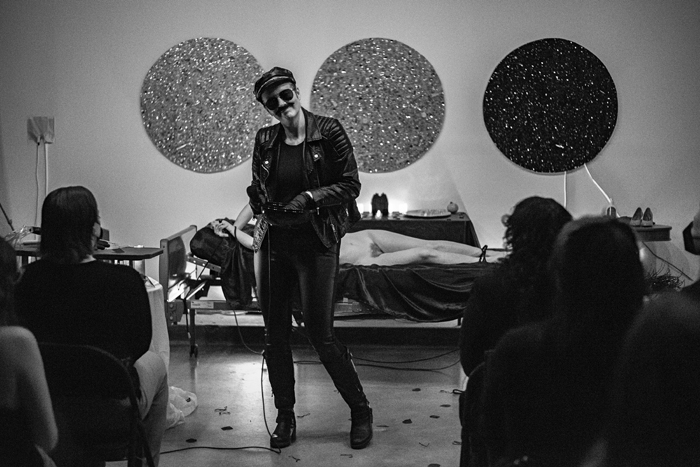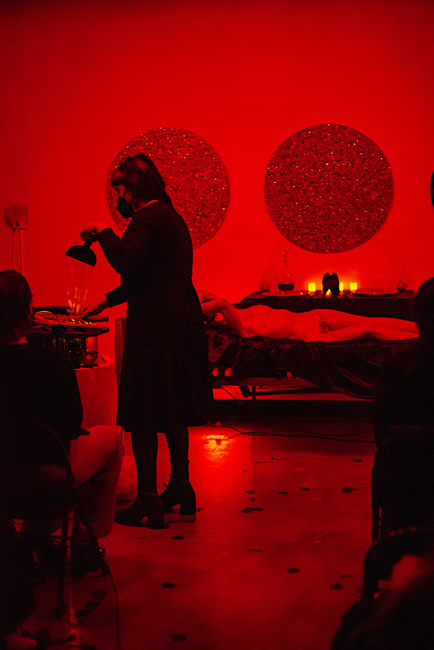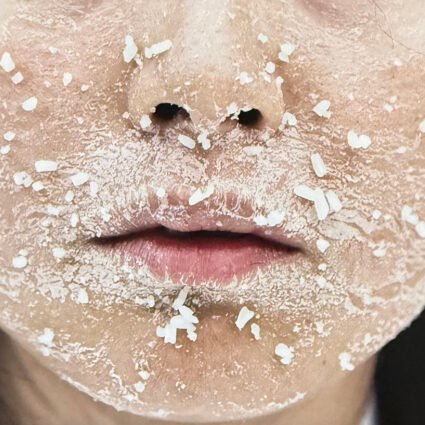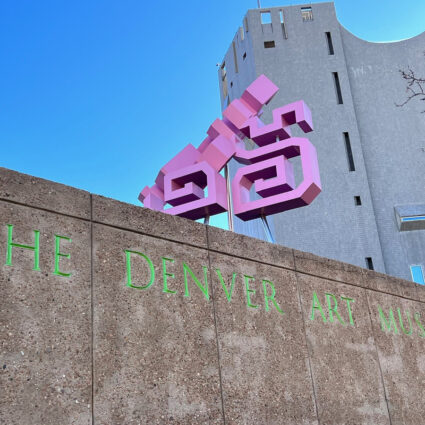Through the subversive and (sac)religious performance Black Mass Blood Ritual, Denver-based artists Mary Grace Bernard and Genevieve Waller create an occult celebration of pain, kink, queerness, and (dis)ability.
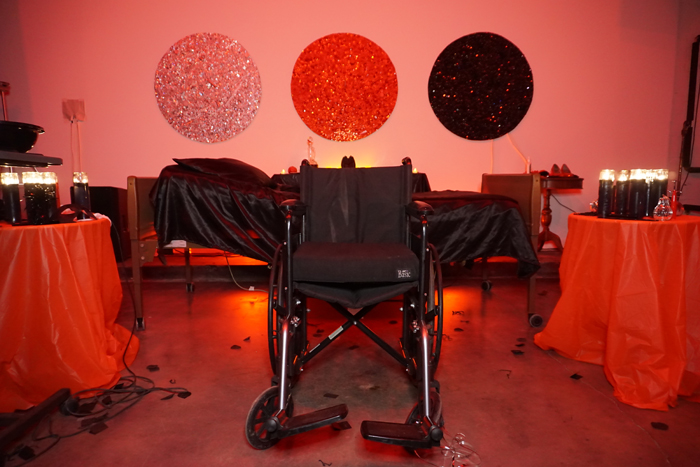
DENVER—As we enter the chapel hidden within Counterpath, we file into “pews” facing the hospital bed-turned-altar, decorated with black satin sheets. Red light fills the room. On the wall behind the altar hangs a triptych of glimmering white, red, and black circles adorned with medical paraphernalia. We all wear black and red at the request of the artists.
We congregants have been invited to participate in artists Mary Grace Bernard and Genevieve Waller’s Black Mass Blood Ritual, an occult reimagining of a Catholic mass through the lenses of chronic illness, BDSM culture, and non-normative bodily desire. Black Mass Blood Ritual is also a continuation of the artists’ collaborative work exploring the intersections of sexuality, (dis)ability,1 care, and dependency through participatory performance.
As the October 14, 2023, event begins, “Black Celebration” by Depeche Mode fills the room. The synth, paired with the dramatic lighting, makes the space seem more like a club than a church. The feeling grows when a mustachioed nun performs a striptease, removing habit and vestments to reveal the ceremony’s officiant, The Dark Manner.
The Dark Manner is Waller’s ongoing drag persona, modeled after leathermen in the BDSM scene. Acting as the ritual’s facilitator, he retrieves the sacrificial subject of the evening, played by Bernard, who enters in a wheelchair, wearing a hospital gown.
Bernard and Waller’s characters take on several different roles in this ceremony: clergy and Christ-figure, dom and sub, and caretaker and chronically ill patient. The dynamics play out as The Dark Manner readies Bernard for the rites, blindfolding and dolling her up with ruby red shoes, lipstick, a beaded choker, and a floral crown. He takes off her gown to reveal her slinky red slip and lays her on the bed. These preparations are kinky yet tender, simultaneously resembling sentimental moments between lovers and the attentiveness of a caregiver dressing their patient for the day.
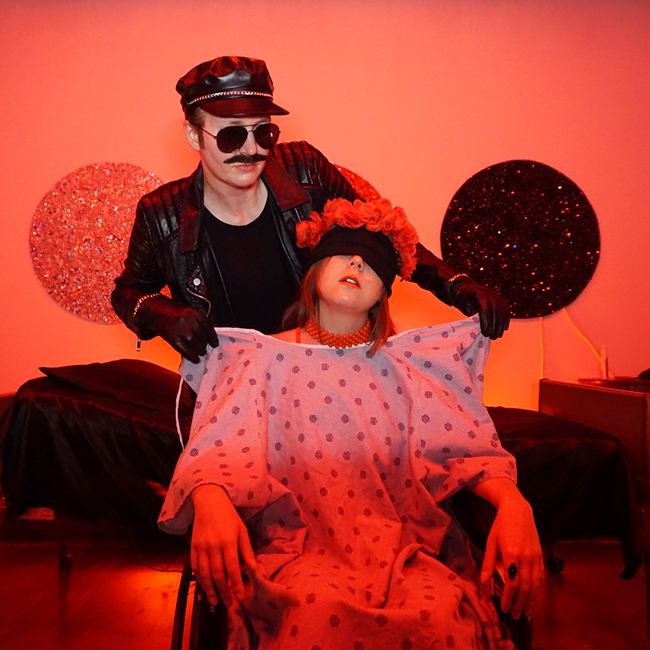
Once Bernard is on the altar, The Dark Manner prepares a Eucharist of her body and blood—in this case, vegan gelatin and iced tea—which we all consume in an intimate and carnal gesture. After we have partaken, The Dark Manner strips Bernard, lays her on her side, and ties her to the bed, leaving her nude and exposed.
This bondage foregrounds the sexual elements of this ritual of pain and care. Waller and Bernard find significance in reexamining caretaker/patient dynamics through dominant/submissive relationships, which provide a renewed sense of control over the body. As BDSM players conduct consensual acts of violence on the body, care is an essential component of setting boundaries and establishing the trust required in moments of extreme vulnerability.
In contrast, Bernard’s experience with cystic fibrosis has involved many hospital visits where she lacks control over her often-painful treatment, conveyed by her restrainment to the hospital bed. While the dependency she experiences in medical settings is frustrating, it becomes freeing when translated to a willing sexual expression. It is a way of “reclaiming pain and reclaiming the consent to pain,” explains Bernard.
Once Bernard is bound, the leatherman invites us up one by one to the altar, where a tray holds BDSM toys: a cat o’ nine tails made of plastic tubing; a four-pronged whip consisting of empty plastic Dornase alfa containers, used to treat cystic fibrosis; and a stuffed latex glove on a stick. These symbols of the pain caused by Bernard’s chronic illness are transformed into implements of pleasure.
The Dark Manner offers commands from his bowl. Kiss. Whisper. Whip. He then instructs us to perform them on Bernard. Most of the audience, myself included, hesitantly draws the “whips.” We’re nervous to inflict pain on a vulnerable, albeit willing, body. Those who put real force behind it surprise the rest of the crowd. These alternating actions continue until all the commands are taken, indicating the end of the ritual.
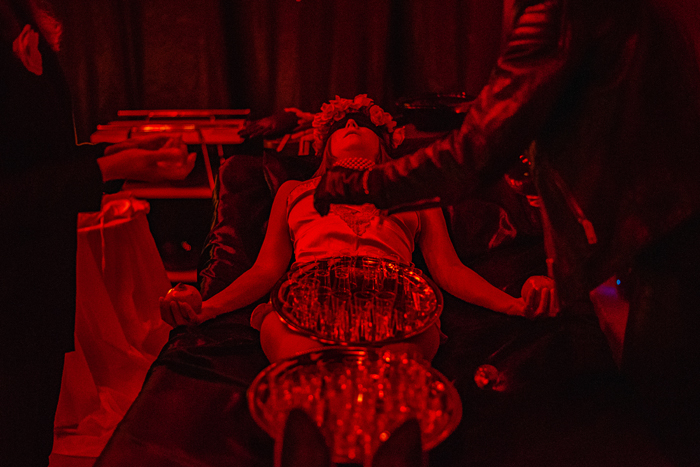
This final act of the performance is undeniably shocking. We are surprised to be active participants in this sadomasochistic play taking place in front of a crowd of mostly strangers. These sexual acts also exist in scandalous proximity to a sacred Christian celebration. Having been raised Catholic, a faith Bernard also grew up with, it is not lost on me that the torture and crucifixion of Christ is called the “passion,” a word whose Latin roots mean suffering.
Where much of Christian teachings about pain and suffering glorify the spirit through an overcoming of the flesh, Bernard and Waller’s Black Mass Blood Ritual diverges by maintaining the worthiness and importance of the body through pleasure.
For Waller, performance art is essential to how they express bodily autonomy. “The body is the material and the medium,” says Waller. “Even when masochism is involved, it’s self-love. It’s that choice that you’re making to say, ‘This is what I want. This is what I like. This is who I am. This is how I want you to see me.’”
The actions that The Dark Manner distributes are ones Bernard herself wrote out before the performance, meaning that although she is physically restrained, we, as the celebrants, are joining the BDSM play of her choosing.
Bernard and Waller explain that it is not just visible sexuality that people find challenging, but more the visibility of queer and (dis)abled desires.
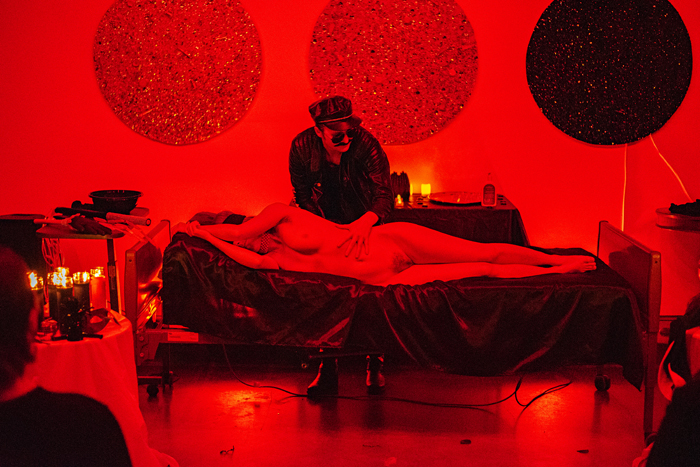
“It’s very uncomfortable for a lot of people to think about disabled people having sex lives, being sexual beings, having desires,” shares Waller. Bernard adds that “[anyone] living with any kind of complex embodiment… has to work so hard for self-love because society keeps telling us that we are unworthy of XYZ because we are not the ‘normal body.’”
The Catholic church’s history of challenging queer identities and opposing LGBTQIA+ rights, such as adoption, paired with prescriptive teachings about gender, reproduction, and the treatment of the body, makes Bernard and Waller’s manipulation of Catholic ritual to reclaim bodily autonomy even more transgressive. With Black Mass Blood Ritual, Bernard and Waller invite us to join in a defiant appropriation of the religious theatrics of pain, an exploration of liberatory sexuality, and a celebration of queer and (dis)abled bodies.
Folks in the Denver area will have the opportunity to join in this occult protest with the second performance of Black Mass Blood Ritual on Saturday, January 27, 2024, from 7-9 pm at the Storeroom. This upcoming performance is an extension and closing reception of the exhibition of the same name currently on view at the Storeroom, which opened November 30, 2023, and includes the ephemera from the ritual as well as related works from their individual practices.
